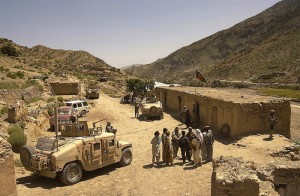Afghanistan “far from ready to assume responsibility for security” for 2014 withdrawal
via Lobe Log
 The International Crisis Group has issued a report strongly critical of the expectations being advanced by US policymakers that Afghanistan will be “stable” enough by 2014 for a handover of national security to Kabul:
The International Crisis Group has issued a report strongly critical of the expectations being advanced by US policymakers that Afghanistan will be “stable” enough by 2014 for a handover of national security to Kabul:
A repeat of previous elections’ chaos and chicanery would trigger a constitutional crisis, lessening chances the present political dispensation can survive the transition. In the current environment, prospects for clean elections and a smooth transition are slim. The electoral process is mired in bureaucratic confusion, institutional duplication and political machinations. Electoral officials indicate that security and financial concerns will force the 2013 provincial council polls to 2014. There are alarming signs Karzai hopes to stack the deck for a favoured proxy. Demonstrating at least will to ensure clean elections could forge a degree of national consensus and boost popular confidence, but steps toward a stable transition must begin now to prevent a precipitous slide toward state collapse. Time is running out.
Institutional rivalries, conflicts over local authority and clashes over the role of Islam in governance have caused the country to lurch from one constitutional crisis to the next for nearly a decade. As foreign aid and investment decline with the approach of the 2014 drawdown, so, too, will political cohesion in the capital.
…. Although Karzai has signalled his intent to exit gracefully, fears remain that he may, directly or indirectly, act to ensure his family’s continued majority ownership stake in the political status quo. This must be avoided. It is critical to keep discord over election results to a minimum; any move to declare a state of emergency in the event of a prolonged electoral dispute would be catastrophic. The political system is too fragile to withstand an extension of Karzai’s mandate or an electoral outcome that appears to expand his family’s dynastic ambitions. Either would risk harming negotiations for a political settlement with the armed and unarmed opposition. It is highly unlikely a Karzai-brokered deal would survive under the current constitutional scheme, in which conflicts persist over judicial review, distribution of local political power and the role of Islamic law in shaping state authority and citizenship. Karzai has considerable sway over the system, but his ability to leverage the process to his advantage beyond 2014 has limits. The elections must be viewed as an opportunity to break with the past and advance reconciliation.
Quiet planning should, nonetheless, begin now for the contingencies of postponed elections and/or imposition of a state of emergency in the run up to or during the presidential campaign season in 2014. The international community must work with the government to develop an action plan for the possibility that elections are significantly delayed or that polling results lead to prolonged disputes or a run-off. The International Security Assistance Force (ISAF) should likewise be prepared to organise additional support to Afghan forces as needed in the event of an election postponement or state of emergency; its leadership would also do well to assess its own force protection needs in such an event well in advance of the election.
All this will require more action by parliament, less interference from the president and greater clarity from the judiciary. Failure to move on these fronts could indirectly lead to a political impasse that would provide a pretext for the declaration of a state of emergency, a situation that would likely lead to full state collapse. Afghan leaders must recognise that the best guarantee of the state’s stability is its ability to guarantee the rule of law during the political and military transition in 2013-2014. If they fail at this, that crucial period will at best result in deep divisions and conflicts within the ruling elite that the Afghan insurgency will exploit. At worst, it could trigger extensive unrest, fragmentation of the security services and perhaps even a much wider civil war. Some possibilities for genuine progress remain, but the window for action is narrowing.
Both the Obama Administration and Romney campaign have committed themselves to completing the handover by 2014.
En Español
The Latest
 From IPS News
From IPS News- Conditions Worsen for Belarus Migrants Stuck in ‘Death Zone’ on EU Border
- Another Climate Victory in Europe… and Counting
- By Sending Nuclear Weapons to UK, Could US be Fueling Nuclear Proliferation?
- Small Island States Fostering Effective Energy Transition To Achieve a Blue Economy
- Attacks on UNRWA Not About Its Neutrality, Says UNRWA Chief
- US Foreign Policy in Middle East Still Governed by Israeli Priorities
- Rich Nation Hypocrisy Accelerating Global Heating
- Seeking Justice for the Civilian Victims of the Syrian Civil War
- Who Should be the Next UN Leader?PART 7 FINAL
- Will a Two-State Solution include Palestine as a UN Member State?
- Online fundraising for IPS Inter Press Service at Razoo













